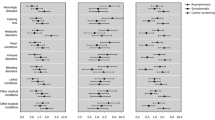Abstract
Background
Parents may pursue common disease risk information about themselves via multiplex genetic susceptibility testing (MGST) for their children.
Purpose
To prospectively assess whether parents who received MGST disclosed their test results to their child, intended to change the child's health habits, or have the child tested.
Methods
Eighty parents who opted for free MGST completed an online survey about a child in their household before undergoing MGST and a follow-up telephone survey 3 months after receiving results.
Results
Few parents (21 %) disclosed results to the child. Undergoing MGST was unrelated to intentions to change the child's health habits but did increase parental willingness to test the child. Greater willingness to test a child was associated with positive attitudes toward pediatric genetic testing and intentions to change the child's health habits.
Conclusion
The experience of receiving MGST had little impact on parents' perceptions or behaviors related to their minor child.

Similar content being viewed by others
References
American Society of Human Genetics Board of Directors, American College of Medical Genetics Board of Directors. Points to consider: ethical, legal, and psychosocial implications of genetic testing in children and adolescents. Am J Hum Genet. 1995; 57(5): 1233-1241.
Bioethics Co. Ethical issues with genetic testing in pediatrics. Pediatrics. 2001; 107(6): 1451-1455.
McBride CM, Guttmacher AE. Commentary: Trailblazing a research agenda at the interface of pediatrics and genomic discovery—a commentary on the psychological aspects of genomics and child health. J Pediatr Psychol. 2009; 34(6): 662-664.
Tercyak KP, Hensley Alford S, Emmons KM, Lipkus IM, Wilfond BS, McBride CM. Parents' attitudes toward pediatric genetic testing for common disease risk. Pediatrics. 2011; 127(5): e1288-e1295.
McBride CM, Alford SH, Reid RJ, Larson EB, Baxevanis AD, Brody LC. Characteristics of users of online personalized genomic risk assessments: implications for physician–patient interactions. Genet Med. 2009; 11(8): 582-587.
Griffin RJ, Dunwoody S, Neuwirth K. Proposed model of the relationship of risk information seeking and processing to the development of preventive behaviors. Environ Res. 1999; 80(2 Pt 2): S230-S245.
Hensley Alford S, McBride CM, Reid RJ, Larson EB, Baxevanis AD, Brody LC. Participation in genetic testing research varies by social group. Public Health Genomics. 2011; 14(2): 85-93.
Kaphingst KA, McBride CM, Wade C, Alford SH, Brody LC, Baxevanis AD. Consumers' use of web-based information and their decisions about multiplex genetic susceptibility testing. J Med Internet Res. 2010; 12(3): e41.
Lipkus IM, Hollands JG. The visual communication of risk. J Natl Cancer Inst Monogr. 1999; 25: 149-163.
Fagerlin A, Ubel PA, Smith DM, Zikmund-Fisher BJ. Making numbers matter: Present and future research in risk communication. Am J Heal Behav. 2007; 31(Suppl 1): S47-S56.
Wade CH, McBride CM, Kardia SL, Brody LC. Considerations for designing a prototype genetic test for use in translational research. Public Health Genomics. 2010; 13(3): 155-165.
Burrows KR, Kelley CK. Parental interrater reliability as a function of situational specificity and familiarity of target child. J Abnorm Child Psychol. 1983; 11(1): 41-47.
Peshkin BN, DeMarco TA, Garber JE, et al. Brief assessment of parents' attitudes toward testing minor children for hereditary breast/ovarian cancer genes: Development and validation of the Pediatric BRCA1/2 Testing Attitudes Scale (P-TAS). J Pediatr Psychol. 2009; 34(6): 627-638.
Sharff ME, Demarco TA, Mays D, et al. Parenting through genetic uncertainty: Themes in the disclosure of breast cancer risk information to children. Genet Test Mol Biomarkers. 2012; 16(5): 376-382.
Bloss CS, Schork NJ, Topol EJ. Effect of direct-to-consumer genome wide profiling to assess disease risk. N Engl J Med. 2011; 364(6): 524-534.
Kaphingst KA, McBride CM, Wade C, et al. Patients' understanding of and responses to multiplex genetic susceptibility test results. Genet Med. 2012; 14(7): 681-687.
McBride CM, Koehly LM, Sanderson SC, Kaphingst KA. The behavioral response to personalized genetic information: will genetic risk profiles motivate individuals and families to choose more healthful behaviors? Annu Rev Public Health. 2010; 31: 89-103.
Marteau TM, French DP, Griffin SJ, et al. Effects of communicating DNA-based disease risk estimates on risk-reducing behaviours. Cochrane Database Syst Rev. 2010; 10, CD007275.
Acknowledgments
This work was supported by the Intramural Research Program of the National Human Genome Research Institute at the National Institutes of Health. The research was also made possible by collaboration with the health management organization Cancer Research Network (CRN) funded by the National Institutes of Health/National Cancer Institute (U19CA079689). The overall goal of the CRN is to use a consortium of delivery systems to conduct cancer research. Additional resources were provided by the Group Health Research Institute and the Henry Ford Hospital. Genotyping services were provided by the Center for Inherited Disease Research, an entity fully funded through a federal contract from the National Institutes of Health to The Johns Hopkins University (HHSN268200782096C). Manuscript preparation was supported by grants from the Ethical, Legal, and Social Implication Research Program of the National Human Genome Research Institute (K18HG006754) and from the National Cancer Institute (R01CA137625 to Kenneth P. Tercyak) and from the National Institute for Child Health and Human Development (K23HD057994 to Beth A. Tarini). Additional thanks are extended to Sharon Hensley Alford, Karen Emmons, Isaac Lipkus, and Benjamin Wilfond who were consultants on the ancillary study. Our thanks go to the study participants who all were members of the Henry Ford Health System.
Conflict of Interest
The authors have no conflict of interest to disclose.
Author information
Authors and Affiliations
Corresponding author
About this article
Cite this article
Madeo, A.C., Tercyak, K.P., Tarini, B.A. et al. Effects of Undergoing Multiplex Genetic Susceptibility Testing on Parent Attitudes towards Testing Their Children. ann. behav. med. 47, 388–394 (2014). https://doi.org/10.1007/s12160-013-9553-z
Published:
Issue Date:
DOI: https://doi.org/10.1007/s12160-013-9553-z




